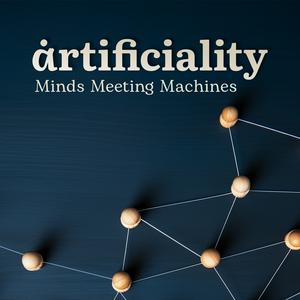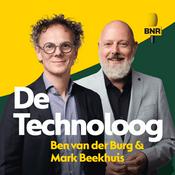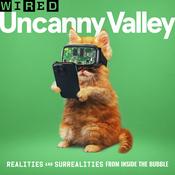108 afleveringen

Helen & Dave Edwards: Becoming Synthetic
09-12-2025 | 25 Min.
We enjoyed giving a virtual keynote for the Autonomous Summit on December 4, 2025, titled Becoming Synthetic: What AI Is Doing To Us, Not Just For Us. We talked about our research on how to maintain human agency & cognitive sovereignty, the philosophical question of what it means to be human, and our new(ish) approach to create better AI tools called unDesign. unDesign is not the absence of design nor is it anti-design. It's design oriented differently. The history of design has been a project of reducing uncertainty. Making things legible. Signaling affordances. Good design means you never have to wonder what to do.Undesign inverts this and uses "uns" as design material. The unknown. The unpredictable. The unplanned. These aren't bugs. They're the medium where value actually lives. Because uncertainty is the condition of genuine encounter. unDesign doesn't design outcomes—it designs the space where outcomes can emerge.You can watch the full keynote below. Check it out!

Tess Posner: AI, Creativity, and Education
09-11-2025 | 51 Min.
In this conversation recorded on the 1,000th day since ChatGPT's launch, we explore education, creativity, and transformation with Tess Posner, founding CEO of AI4ALL. For nearly a decade—long before the current AI surge—Tess has led efforts to broaden access to AI education, starting from a 2016 summer camp at Stanford that demonstrated how exposure to hands-on AI projects could inspire high school students, particularly young women, to pursue careers in the field.What began as exposing students to "the magic" of AI possibilities has evolved into something more complex: helping young people navigate a moment of radical uncertainty while developing both technical capabilities and critical thinking about implications. As Tess observes, we're recording at a time when universities are simultaneously banning ChatGPT and embracing it, when the job market for graduates is sobering, and when the entire structure of work is being "reinvented from the ground up."Key themes we explore:Living the Questions: How Tess's team adopted Rilke's concept of "living the questions" as their guiding principle for navigating unprecedented change—recognizing that answers won't come easily and that cultivating wisdom matters more than chasing certaintyThe Diverse Pain Point: Why students from varied backgrounds gravitate toward different AI applications—from predicting droughts for farm worker families to detecting Alzheimer's based on personal experience—and how this diversity of lived experience shapes what problems get attentionProject-Based Learning as Anchor: How hands-on making and building creates the kind of applied learning that both reveals AI's possibilities and exposes its limitations, while fostering the critical thinking skills that pure consumption of AI outputs cannot developThe Educational Reckoning: Why this moment is forcing fundamental questions about the purpose of schooling—moving beyond detection tools and honor codes toward reimagining how learning happens when instant answers are always availableThe Worst Job Market in Decades: Sobering realities facing graduates alongside surprising opportunities—some companies doubling down on "AI native" early career talent while others fundamentally restructure work around managing AI agents rather than doing tasks directlyMusic and the Soul Question: Tess's personal wrestling with AI-generated music that can mimic human emotional expression so convincingly it gets stuck in your head—forcing questions about whether something deeper than output quality matters in artThe conversation reveals someone committed to equity and access while refusing easy optimism about technology's trajectory. Tess acknowledges that "nobody really knows" what the future of work looks like or how education should adapt, yet maintains that the response cannot be paralysis. Instead, AI4ALL's approach emphasizes building community, developing genuine technical skills, and threading ethical considerations through every project—equipping students not with certainty but with agency.About Tess Posner: Tess Posner is founding and interim CEO of AI4ALL, a nonprofit working to increase diversity and inclusion in AI education, research, development, and policy. Since 2017, she has led the organization's expansion from a single summer program at Stanford to a nationwide initiative serving students from over 150 universities. A graduate of St. John's College with its Great Books curriculum, Tess is also an accomplished musician who brings both technical expertise and humanistic perspective to questions about AI's role in creativity and human flourishing.Our Theme Music:Solid State (Reprise)Written & performed by Jonathan CoultonLicense: Perpetual, worldwide licence for podcast theme usage granted to Artificiality Institute by songwriter and publisher

Eric Schwitzgebel: The Weirdness of the World
17-10-2025 | 50 Min.
In this conversation, we explore the philosophical art of embracing uncertainty with Eric Schwitzgebel, Professor of Philosophy at UC Riverside and author of "The Weirdness of the World." Eric's work celebrates what he calls "the philosophy of opening"—not rushing to close off possibilities, but instead revealing how many more viable alternatives exist than we typically recognize. As he observes, learning that the world is less comprehensible than you thought, that more possibilities remain open, constitutes a valuable form of knowledge in itself.The conversation centers on one of Eric's most provocative arguments: that if we take mainstream scientific theories of consciousness seriously and apply them consistently, the United States might qualify as a conscious entity. Not in some fascist "absorb yourself into the group mind" sense, but perhaps at the level of a rabbit—possessing massive internal information processing, sophisticated environmental responsiveness, self-monitoring capabilities, and all the neural substrate you could want (just distributed across individual skulls rather than contained in one).Key themes we explore:The United States Consciousness Thought Experiment: How standard materialist theories that attribute consciousness to animals based on information processing and behavioral complexity would, if applied consistently, suggest large-scale collective entities might be conscious too—and why every attempt to wiggle out of this conclusion commits you to other forms of weirdnessPhilosophy of Opening vs. Closing: Eric's distinction between philosophical work that narrows possibilities to find definitive answers versus work that reveals previously unconsidered alternatives, expanding rather than contracting the space of viable theoriesThe AI Consciousness Crisis Ahead: Why we'll face social decisions about how to treat AI systems before we have scientific consensus on whether they're conscious—with respectable theories supporting radically different conclusions and people's investments (emotional, religious, economic) driving which theories they embraceMimicry and Mistrust: Why we're justified in being more skeptical about AI consciousness than human consciousness—not because similarity proves anything definitively, but because AI systems trained to mimic human linguistic patterns raise the same concerns as parrots saying "hoist the flag"The Design Policy of the Excluded Middle: Eric's recommendation (which he doubts the world will follow) to avoid creating systems whose moral status we cannot determine—because making mistakes in either direction could be catastrophic at scaleStrange Intelligence Over Superintelligence: Why the linear conception of AI as "subhuman, then human, then superhuman" fundamentally misunderstands what's likely to emerge—we should expect radically different cognitive architectures with cross-cutting capacities and incapacities rather than human-like minds that are simply "better"About Eric Schwitzgebel: Eric Schwitzgebel is Professor of Philosophy at the University of California, Riverside, specializing in philosophy of mind and moral psychology. His work spans consciousness, introspection, and the ethics of artificial intelligence. Author of "The Weirdness of the World" and a forthcoming book on AI consciousness and moral status, Eric maintains an active blog (The Splintered Mind) where he explores philosophical questions with clarity and wit. His scholarship consistently challenges comfortable assumptions while remaining remarkably accessible to readers beyond academic philosophy.

John Pasmore: Inclusive AI
11-10-2025 | 34 Min.
In this conversation, we explore the challenges of building more inclusive AI systems with John Pasmore, founder and CEO of Latimer AI and advisor to the Artificiality Institute. Latimer represents a fundamentally different approach to large language models—one built from the ground up to address the systematic gaps in how AI systems represent Black and Brown cultures, histories, and perspectives that have been largely absent from mainstream training data.John brings a practical founder's perspective to questions that often remain abstract in AI discourse. With over 400 educational institutions now using Latimer, he's witnessing firsthand how students, faculty, and administrators are navigating the integration of AI into learning—from universities licensing 40+ different LLMs to schools still grappling with whether AI represents a cheating risk or a pedagogical opportunity.Key themes we explore:The Data Gap: Why mainstream LLMs reflect a narrow "Western culture bias" and what's missing when AI claims to "know everything"—from 15 million unscanned pages in Howard University's library to oral traditions across thousands of indigenous tribes.Critical Thinking vs. Convenience: How universities are struggling to preserve deep learning and intellectual rigor when AI makes it trivially easy to get instant answers, and whether requiring students to bring their prompts to class represents a viable path forward.The GPS Analogy: John's insight that AI's effect on cognitive skills mirrors what happened with navigation—we've gained efficiency but lost the embodied knowledge that comes from building mental maps through direct experience.Multiple Models, Multiple Perspectives: Why the future likely involves domain-specific and culturally-situated LLMs rather than a single "universal" system, and how this parallels the reality that different cultures tell different stories about the same events.Excavating Hidden Knowledge: Latimer's ambitious project to digitize and make accessible vast archives of cultural material—from church records to small museum collections—that never made it onto the internet and therefore don't exist in mainstream AI systems.An eBay for Data: John's vision for creating a marketplace where content owners can license their data to AI companies, establishing both proper compensation and a mechanism for filling the systematic gaps in training corpora.The conversation shows that AI bias goes beyond removing offensive outputs. We need to rethink which data sources we treat as authoritative and whose perspectives shape these influential systems. When AI presents itself as an oracle that has "read everything on the internet," it claims omniscience while excluding vast amounts of human knowledge and experience.The discussion raises questions about expertise and process in an era of instant answers—in debugging code, navigating cities, or writing essays. John notes that we may be "working against evolution" by preserving slower, more effortful learning when our brains naturally seek efficiency. But what do we lose when we eliminate the struggle that builds deeper understanding?About John Pasmore: John Pasmore is founder and CEO of Latimer AI, a large language model built to provide accurate historical information and bias-free interaction for Black and Brown audiences and anyone who values precision in their data. Previously a partner at TRS Capital and Movita Organics, John serves on the Board of Directors of Outward Bound USA and holds degrees in Business Administration from SUNY and Computer Science from Columbia University. He is also an advisor to the Artificiality Institute.

De Kai: Raising AI
21-9-2025 | 54 Min.
In this conversation, we explore how humans can better navigate the AI era with De Kai, pioneering researcher who built the web's first machine translation systems and whose work spawned Google Translate. Drawing on four decades of AI research experience, De Kai offers a different framework for understanding our relationship with artificial intelligence—moving beyond outdated metaphors toward more constructive approaches.De Kai's perspective was shaped by observing how AI technologies are being deployed in ways that increase rather than decrease human understanding. While AI has tremendous potential to help people communicate across cultural and linguistic differences—as his translation work demonstrated—current implementations often amplify polarization and misunderstanding instead.Key themes we explore:Beyond Machine Metaphors: Why thinking of AI as "tools" or "machines" is dangerously outdated—AI systems are fundamentally artificial psychological entities that learn, adapt, and influence human behavior in ways no coffee maker ever couldThe Parenting Framework: De Kai's central insight that we're all currently "parenting" roughly 100 artificial intelligences daily through our smartphones, tablets, and devices—AIs that are watching, learning, and imitating our attitudes, behaviors, and belief systemsSystem One vs. System Two Intelligence: How current large language models operate primarily through "artificial autism"—brilliant pattern matching without the reflective, critical thinking capacities that characterize mature human intelligenceTranslation as Understanding: Moving beyond simple language translation toward what De Kai calls a "translation mindset"—using AI to help humans understand different cultural framings and perspectives rather than enforcing singular universal truthsThe Reframing Superpower: How AI's capacity for rapid perspective-shifting and metaphorical reasoning represents one of humanity's best hopes for breaking out of polarized narratives and finding common groundSocial Fabric Transformation: Understanding how 800 billion artificial minds embedded in our social networks are already reshaping how cultures and civilizations evolve—often in ways that increase rather than decrease mutual understandingDrawing on insights from developmental psychology and complex systems, De Kai's "Raising AI" framework emphasizes conscious human responsibility in shaping how these artificial minds develop. Rather than viewing this as an overwhelming burden, he frames it as an opportunity for humans to become more intentional about the values and behaviors they model—both for AI systems and for each other.About De Kai: De Kai is Professor of Computer Science and Engineering at HKUST and Distinguished Research Scholar at Berkeley’s International Computer Science Institute. He is Independent Director of AI ethics think tank The Future Society, and was one of eight inaugural members of Google’s AI ethics council. De Kai invented and built the world’s first global-scale online language translator that spawned Google Translate, Yahoo Translate, and Microsoft Bing Translator. For his pioneering contributions in AI, natural language processing, and machine learning, De Kai was honored by the Association for Computational Linguistics as one of only seventeen Founding Fellows and by Debrett’s as one of the 100 most influential figures of Hong Kong.
Meer Technologie podcasts
Trending Technologie -podcasts
Over Artificiality: Being with AI
Luister naar Artificiality: Being with AI, Lex Fridman Podcast en vele andere podcasts van over de hele wereld met de radio.net-app

Ontvang de gratis radio.net app
- Zenders en podcasts om te bookmarken
- Streamen via Wi-Fi of Bluetooth
- Ondersteunt Carplay & Android Auto
- Veel andere app-functies
Ontvang de gratis radio.net app
- Zenders en podcasts om te bookmarken
- Streamen via Wi-Fi of Bluetooth
- Ondersteunt Carplay & Android Auto
- Veel andere app-functies


Artificiality: Being with AI
download de app,
luisteren.





































